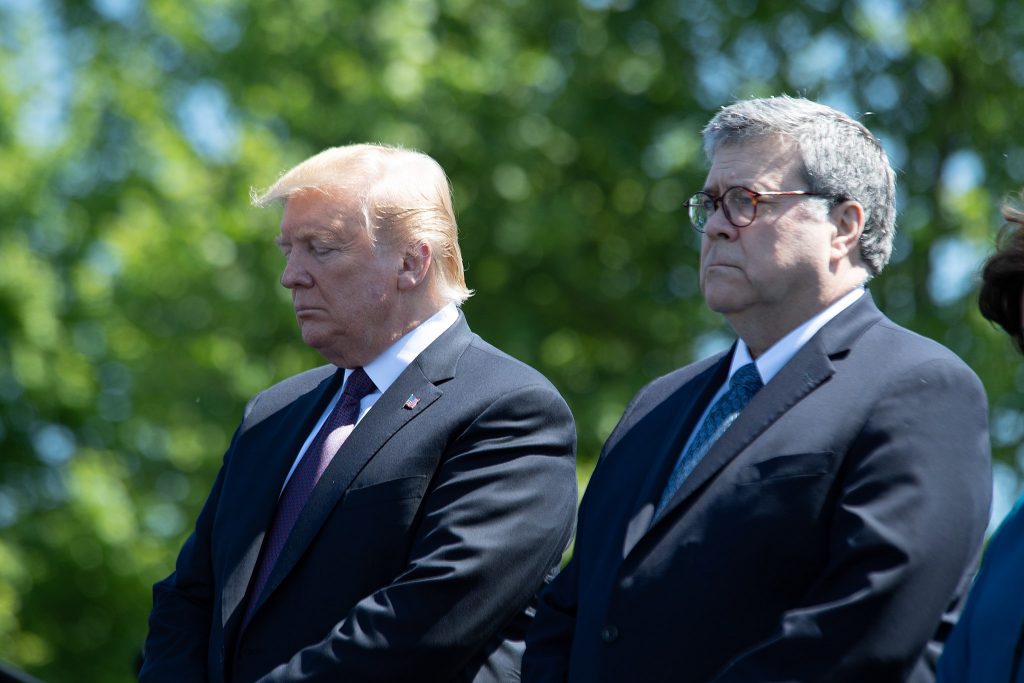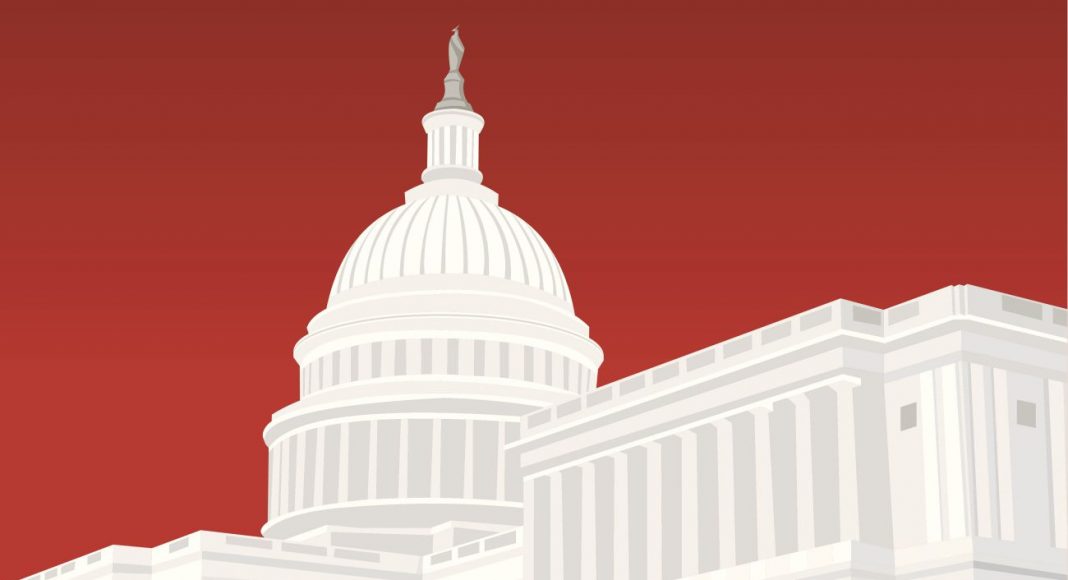Misuse of antitrust for partisan purposes violates a norm intended to insulate enforcement from direct political influence and discourage politicians from exploiting enforcement decisions to further their own interests, and undermines trust in the fairness of the legal process.
Editor’s note: Last month, whistleblower John Elias—a career employee at the Department of Justice—testified before the House Judiciary Committee that the Antitrust Division, at the direction of Attorney General William Barr, undertook ten in-depth investigations of cannabis industry mergers, not for good antitrust reasons but simply because he “did not like the nature of their underlying business.” Elias also testified that the Antitrust Division opened an investigation of an emissions standards agreement between California and four major automakers at the direction of its political leadership in the immediate wake of tweets by President Trump criticizing the agreement, and made the investigation public—without first asking staff to analyze the obvious potential defense that the agreement was permissible under the antitrust laws because of California’s active involvement. Elias’s testimony raised all too familiar concerns regarding the potential politicization of antitrust under the current administration. In the text below, Jonathan Baker, a Research Professor of Law at American University Washington College of Law and former chief economist at the FTC and the FCC, explains the problems with the potential politicization of US antitrust enforcement.
Antitrust is a powerful machine— both for maintaining competition and for advancing the interests of politicians who wrest control of its operation. From his seat in the Oval Office, Lyndon Johnson held up the antitrust review of a bank acquisition until a newspaper publisher, who also ran one of the merging banks, agreed to reverse the paper’s editorial position against him.
President Nixon ordered the Justice Department not to appeal a lost court challenge to a merger by International Telephone & Telegraph, allegedly in exchange for a substantial contribution by ITT to the Republican National Convention. Nixon also threatened three major television networks with antitrust lawsuits in an effort to extract better news coverage and allegedly accepted a campaign contribution from Howard Hughes in exchange for withholding an antitrust challenge to a planned Las Vegas hotel acquisition.
Like law enforcement generally, antitrust can be corrupted by firms seeking economic advantage, as with Nixon’s alleged deals with ITT and Hughes. It can be misused by politicians for partisan purposes, as with Johnson’s and Nixon’s manipulations of journalists.
These examples provoke outrage because they violate a norm intended to insulate antitrust enforcement from direct political influence. That norm helps prevent firms from manipulating the political system to exercise market power through special-interest protectionism and crony capitalism. It also discourages politicians from exploiting enforcement decisions to further their own interests without regard to the public good.
That’s what whistleblower John Elias accused the Trump Justice Department’s leadership of doing in his compelling congressional testimony. According to Elias, the Antitrust Division devoted a substantial portion of its resources for investigating mergers to ten obviously meritless investigations of cannabis industry transactions by issuing extensive information requests to the parties—not for good antitrust enforcement reasons but because of Attorney General William Barr’s personal animus toward the industry.
Elias also charged that the Antitrust Division opened an investigation into an agreement between multiple automobile manufacturers and the state of California to curtail emissions beyond what federal rules were going to require in the immediate wake of critical tweets by a reportedly “enraged” President Trump, with no staff input and without pausing to consult with California about whether the well-established and plausible “state action” defense would apply. In both cases, Elias alleged that enforcement was misused for more ignoble and mundane reasons than in the Johnson and Nixon examples: to punish firms that the Attorney General dislikes or that did not follow the President’s approach for addressing a controversial matter of public policy.
These concerns reinforce the importance of insulating antitrust from politics, which holds no matter who is in power.

Antitrust law and enforcement should be apolitical, but they necessarily operate in a political context. Antitrust law once explicitly pursued social and political goals in addition to the economic goals that are central today. Moreover, progressives have grown more concerned about market power precisely because of its adverse political consequences. These critics seek to use antitrust systematically to attack corporate concentration in order to redistribute political power away from concentrated centers of wealth and thereby, progressives hope, increase economic opportunity. Today’s antitrust institutions face many political threats, not least of which is the stealth rejection of antitrust in favor of laissez-faire.
Yet, even though concerns about the politicization of antitrust are justified, as the Elias testimony illustrated, a political mobilization to take on growing market power could strengthen our informal political bargain to rely on competition implemented through antitrust enforcement—not laissez-faire or direct governmental supervision—as the primary approach to regulating large firms. This mobilization ought not promote the formula of midcentury antitrust, which explicitly, albeit secondarily, pursued political ends. These methods were of limited success, and pressing for their return would divert effort away from more promising reforms.
A movement focused on attacking market power would strengthen the political bargain, first and foremost, because market power has become a serious problem. And second, antitrust enforcement, as currently practiced, discourages the sort of political shenanigans exemplified by the Johnson and Nixon cases. These are rare exceptions in the modern era. For the most part, antitrust is successfully divorced from abuse by special interests and crony capitalists, and undermining market power would make such abuse even less likely.
Many obstacles, including the norm against direct political influence and rules that limit judicial discretion, stand in the way of political abuse. Yet, even as antitrust shuns politics, it retains a connection to the popular will. This reflects an important distinction between politics and ideology. Enforcement is, properly, responsive to ideological shifts, and enforcement would be stronger if the public were to mobilize against market power. But that doesn’t mean antitrust enforcement should be subject as well to the sort of abuse that undermines trust in the fairness of the legal process.
“In the US political system, the threat of oligarchy comes from the ability of the wealthy to capture political institutions, change those institutions to lock in their political positions, and use their control of institutions to, among other things, lower their taxes.”
Special-Interest Protectionism and Crony Capitalism
Special-interest protectionism and crony capitalism are related ways of manipulating the political system to exercise market power.
Special-interest protectionism refers to the ability of firms or other narrow interest groups to establish or entrench protected positions through government action. A particular firm or industry may influence the government to act in its favor, without regard to the public interest, in order to create or protect market power. Congress and the courts have created exemptions from the antitrust laws over time to benefit particular industries, perhaps for this reason. Special-interest protectionism was a prominent concern of nineteenth-century constitutional interpretation and twentieth-century public-choice scholars. It is closely related to regulatory capture: the manipulation of a regulatory agency by a firm it supervises.
The incentive underlying manipulation is obvious. Profit-maximizing firms, individually or along with their major rivals, can gain market power by investing in lobbying. Compliant government officials, elected or otherwise, may create entry barriers or foreclose fringe competitors’ access to customers or low-cost inputs.
Even Chicago School–oriented antitrust commentators, who question antitrust’s concern with exclusionary marketplace conduct, acknowledge that predation through use of governmental processes could be a serious problem.
While special-interest protectionism is transactional and episodic, “crony capitalism” is systemic and entrenched. Firms secure lasting political power through their individual or collective size and lobbying influence and use that power to obtain and protect market power. They may create entry barriers or, more corruptly, obtain other forms of enrichment for themselves or their political allies (that is, their cronies). Crony capitalism becomes ingrained when firms with market power invest some of the resulting rents to secure the political power that helps protect or extend it. This erodes antitrust constraints still further, creating more market power, and so forth, in a vicious cycle.
Crony capitalism differs from oligarchy, though they can be related. An oligarchy is a political system in which a small number of political actors control vast resources, which they deploy to enhance or defend their personal wealth and social position.
In the US political system, the threat of oligarchy comes from the ability of the wealthy to capture political institutions, change those institutions to lock in their political positions, and use their control of institutions to, among other things, lower their taxes. Lock in might be facilitated by restricting the franchise, eviscerating constraints on corporate political contributions, or undermining institutions such as unions that could supply political opposition to large firms.
This threat is not merely speculative: the disproportionate influence of the wealthiest on public policy is well-documented, and successful political coalitions may attempt to change the rules to protect their positions.
This combination is equally dangerous for political and economic competition. To the extent that large firms are owned by wealthy families, the political system could tend toward crony capitalism and oligarchy simultaneously. Political institutions could then both protect large firms from competition and systematically enrich the wealthy.
Trump’s election has made concerns about special-interest protectionism, crony capitalism, and oligarchy more salient. The norm against direct political influence is endangered by the combination of Trump’s campaign statements threatening antitrust challenges for political ends, his post-election meetings with executives from firms pursuing acquisitions under review at the enforcement agencies, his agreements with certain firms to keep jobs from moving abroad, his frequent criticism of law enforcement decisions with which he disagrees, and his extensive personal and familial financial interests. These encourage firms to lobby the president directly in order to influence enforcement actions. They also raise the possibility that the president would base decisions on his political or financial interests.
Trump’s signals have been recognized by the business community: the chief executive officer (CEO) of AT&T said he was flabbergasted by the administration’s decision to challenge his firm’s proposed acquisition of Time Warner, in part because he has been one of Trump’s “biggest defenders on public policy.”
Even where Trump’s goals plausibly relate to public interests, they may not be acceptable under antitrust law. For example, boosting domestic employment is not cognizable under the Clayton Act as currently interpreted. Beyond flouting a norm or violating the Clayton Act, presidential involvement in antitrust enforcement decisions could contravene the Constitution.
If a president instructs the Justice Department on the resolution of merger reviews or other antitrust investigations—particularly without hearing from agency staff and other interested parties and without reviewing the detailed factual record developed by an agency investigation—it is hard to be confident that agency enforcement decisions appropriately apply the law to the facts, uninfluenced by the political or financial interests of the president. That scenario would call into question whether the president has met his constitutional obligation to “take care that the laws be faithfully executed.”
Even if agency decisions are free from direct presidential influence, the concern that they might not be undermines confidence that enforcement actions serve the public interest and undercuts political support for antitrust institutions and norms. It also harms enforcement by diminishing the credibility of agency officials with courts and firms.
A prudent administration would insulate antitrust enforcement from direct presidential influence, as has been routine in the modern era and formalized institutionally since Watergate.
At the start of the administration, Trump’s senior antitrust enforcers said the right things. During his hearing for confirmation, Trump’s first attorney general, Jeff Sessions said, “There will not be political interference” in the merger review process. The then-nominee for assistant attorney general for antitrust, Makan Delrahim, agreed that political considerations should not influence the handling of antitrust cases.
But the recent revelations from John Elias call into question whether the Trump administration is adhering to the norm. That would not be out of character, as the Trump administration has put pressure on many other deeply entrenched political and institutional norms.
The above article is based on an excerpt from The Antitrust Paradigm: Restoring a Competitive Economy by Jonathan B. Baker, published by Harvard University Press. Copyright © 2019 by the President and Fellows of Harvard College. Used by permission. All rights reserved.







